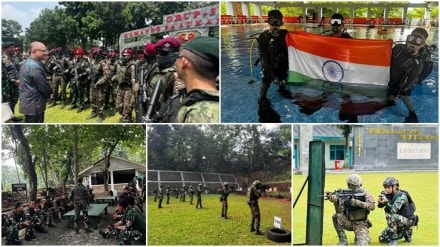The 9th edition of the Indo-Indonesia Joint Special Forces Exercise, GARUDA SHAKTI, commenced at Mokopassus in Cijantung, Indonesia, reflecting the growing strength of India-ASEAN defence ties. This exercise underscores the significance of military cooperation and strategic partnerships between India and Southeast Asian nations as part of broader regional security initiatives. Notably, 2024 also marks the 10th anniversary of India’s Act East Policy—an opportune moment to celebrate its achievements in fostering regional collaboration and strategic depth.
Exercise GARUDA SHAKTI: Enhancing Tactical Interoperability
The GARUDA SHAKTI exercise involves the participation of 25 Indian Army personnel from the elite Parachute Regiment (Special Forces) and 40 Indonesian Special Forces personnel from Kopassus. Running from November 1 to 12, the exercise focuses on sharing mission planning strategies, operational tactics, and best practices for conducting special operations in jungle terrain—a challenging environment that tests the operational readiness and adaptability of forces.
Joint exercises like GARUDA SHAKTI are vital for deepening understanding and fostering interoperability between the participating militaries. The training includes tactical drills, planning and execution of special operations, and sharing of advanced skills related to weapons, equipment, and operational innovations. The comprehensive nature of these drills not only enhances military capabilities but also strengthens the mutual trust and camaraderie between the two armies.
The joint training incorporates simulations of strikes on terrorist camps and a validation exercise that integrates basic and advanced skills. This strategic engagement allows both nations to address shared security challenges effectively and showcases their commitment to combating terrorism and maintaining peace in the region.
Significance of Defence Ties with ASEAN
India’s defence cooperation with ASEAN countries, including Indonesia, has gained prominence as regional dynamics shift in the Indo-Pacific. The sale of the BrahMos supersonic missile system—developed by BrahMos Aerospace, a joint venture between India and Russia—to the Philippines marked a significant milestone in defence exports and highlighted India’s capability as a reliable partner in advanced military technology. Indonesia’s interest in acquiring the air-launched version of the BrahMos missile signifies the deepening military cooperation and reflects a strategic alignment that bolsters regional defence postures.
The potential BrahMos deal with Indonesia comes amid its efforts to modernize its military and enhance its defence capabilities, especially in the context of regional security concerns such as those in the South China Sea. Indonesia’s defence modernization, which has included purchases of Russian SU-27 fighters and Kilo-class submarines, further underscores its intent to fortify its military arsenal with advanced weaponry from trusted partners like India.
India’s proactive role in promoting defence exports aligns with its larger strategy under the Act East Policy. The BrahMos missile system, known for its precision and supersonic speed, has drawn interest from various ASEAN countries, positioning India as a strategic defence partner capable of contributing to regional stability.
10 Years of the Act East Policy: A Strategic Milestone
Launched in 2014 under Prime Minister Narendra Modi’s leadership, the Act East Policy was a strategic pivot from the earlier Look East Policy. It aimed to reinforce India’s ties with Southeast Asia by fostering comprehensive engagement—economic, cultural, and strategic—with the region. Over the past decade, the Act East Policy has evolved into a vital framework that bolsters India’s role in the Indo-Pacific, emphasizing collaboration in trade, connectivity, and security.
Bilateral trade between India and ASEAN has witnessed significant growth, rising from USD 65 billion in 2015-16 to USD 120 billion in 2023-24. Indian exports to ASEAN countries have similarly seen a steady increase, highlighting the mutual economic benefits. Additionally, ASEAN’s cumulative investment in India has reached approximately USD 160 billion, showcasing the policy’s economic success and its role in attracting foreign capital.
The Act East Policy has also paved the way for enhanced defence cooperation. Initiatives such as joint military exercises, strategic dialogues, and defence equipment sales reflect India’s commitment to being a reliable security partner. Exercises like GARUDA SHAKTI epitomize the operational aspects of this cooperation, where shared training and knowledge exchange contribute to a stronger regional defence framework.
